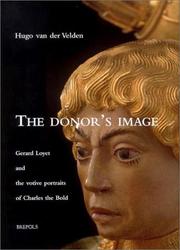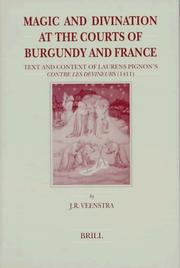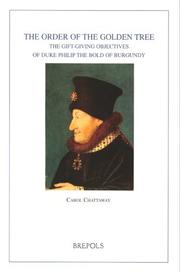| Listing 1 - 10 of 18 | << page >> |
Sort by
|
Book
ISBN: 0582502519 9780582502512 Year: 1973 Volume: 4 Publisher: London: Longman,
Abstract | Keywords | Export | Availability | Bookmark
 Loading...
Loading...Choose an application
- Reference Manager
- EndNote
- RefWorks (Direct export to RefWorks)
Charles, --- Burgundy (France) --- Europe --- Bourgogne (France) --- History --- Histoire --- Charles --- 949.3.015 --- Geschiedenis van België: Bourgondische periode (1384-1482) --- Charles Duke of Burgundy --- -Europe --- Council of Europe countries --- Eastern Hemisphere --- Eurasia --- -History --- -Charles, --- -949.3.015 --- 949.3.015 Geschiedenis van België: Bourgondische periode (1384-1482) --- Charles the Bold, --- Burgundy, Charles, --- Bourgogne, Charles, --- Karel de Stoute, --- Karl der Kühne, --- Charles le Téméraire, --- Charles le Hardy, --- Charles le Hardi, --- Europe - History - 15th century --- Burgundy (France) - History - House of Valois, 1363-1477

ISBN: 2503507220 9782503507224 Year: 2000 Volume: 2 Publisher: Turnhout: Brepols,
Abstract | Keywords | Export | Availability | Bookmark
 Loading...
Loading...Choose an application
- Reference Manager
- EndNote
- RefWorks (Direct export to RefWorks)
ex-votos [religious visual works] --- Art --- goldsmiths --- Loyet, Gerard --- Charles the Bold --- Goldwork, Medieval --- Orfèvrerie médiévale --- Loyet, Gérard --- Charles, --- Art metal-work, Medieval --- Votive offerings in art --- 739 --- 949.3.015 --- Edelsmeedkunst. Kunstsmederij. --- Geschiedenis van België: Bourgondische periode (1384-1482) --- Votive offerings in art. --- Loyet, Gerard, --- Art. --- 949.3.015 Geschiedenis van België: Bourgondische periode (1384-1482) --- 739 Edelsmeedkunst. Kunstsmederij. --- Orfèvrerie médiévale --- Loyet, Gérard --- Edelsmeedkunst. Kunstsmederij --- Art metal-work, Medieval - Netherlands

ISSN: 09208607 ISBN: 9004109250 9004247378 9789004109254 Year: 1998 Volume: . 83 Publisher: Leiden: Brill,
Abstract | Keywords | Export | Availability | Bookmark
 Loading...
Loading...Choose an application
- Reference Manager
- EndNote
- RefWorks (Direct export to RefWorks)
The magicians and astrologers who frequented the courts of Burgundy and France during the reign of Charles VI to render their dubious services to king and nobles, induced friar Laurens Pignon OP to write a treatise called Contre les devineurs (1411) which he dedicated to John the Fearless, duke of Burgundy. This book presents a critical edition of the treatise and tries to reconstruct its historical and intellectual context by examining the role of magic and astrology at court. By means of theological and philosophical arguments which he derives from Aquinas, Pignon demonstrates the dangers and deficiencies of divination. In three appendices editions of supplementary documents are supplied: a confession of a court-magician, two divinatory texts and a fictional prognostication on the house of Burgundy.
Esoteric sciences --- Pignon, Laurens --- Magic --- Divination --- Magie --- History --- History. --- Histoire --- Pignon, Laurens, --- Burgundy (France) --- France --- Bourgogne (France) --- Religion --- 398.4 --- 930.86.01 --- 949.3.015 --- 133.430944 --- 133.430902 --- Bovennatuurlijke verschijnselen. Geesten spoken. Bovenzinnelijke wereld. Bijgeloof --- Mentaliteitsgeschiedenis:--Middeleeuwen --- Geschiedenis van België: Bourgondische periode (1384-1482) --- Philosophy & psychology Magic and witchcraft Europe France --- Philosophy & psychology Magic and witchcraft (500 - 1500) --- 949.3.015 Geschiedenis van België: Bourgondische periode (1384-1482) --- 930.86.01 Mentaliteitsgeschiedenis:--Middeleeuwen --- 398.4 Bovennatuurlijke verschijnselen. Geesten spoken. Bovenzinnelijke wereld. Bijgeloof --- Magick --- Necromancy --- Sorcery --- Spells --- Occultism --- Augury --- Soothsaying --- Worship --- Pignon, Laurens, - -1449 - Contre les devineurs
Book
ISBN: 250351037X 9782503510378 9782503537146 Year: 2001 Volume: 4 Publisher: Turnhout: Brepols,
Abstract | Keywords | Export | Availability | Bookmark
 Loading...
Loading...Choose an application
- Reference Manager
- EndNote
- RefWorks (Direct export to RefWorks)
The fifteenth century was of crucial importance for the Low Countries. After centuries of gradual political disintegration, a rapid unification took place during the reign of the Burgundian dukes, Philip the Good and Charles the Bold. How did this new ‘state’ work? To most people the political high-points are well known; but the slow process of integration that had by then started remains, by contrast, largely unknown. In this process, the regional institutions, which were thoroughly modernised by the Burgundian dukes, seem to have played a key role. The first part of this volume discusses the role of these regional institutions. In particular it studies the role in the principalities of Brabant, Holland and Flanders of civil servants as formal and informal ‘powerbrokers’ between central government and subjects in the Low Countries during the Burgundian period.The Low Countries, however, cannot be treated in isolation from its neighbours: they were situated literally on the frontier of the Holy Roman Empire and France and there were intensive commercial and political contacts with England. Therefore, by way of comparison, the second part of this volume contrasts developments in other European countries, in particular, France, the Empire and England.The articles in this volume are written by a group of distinguished specialists in the field of administrative history, working at universities in Belgium, France, Germany, the Netherlands and the United Kingdom.
History of the Low Countries --- anno 1200-1499 --- Burgundy (France) --- Flanders --- Courts and courtiers --- History --- Geschiedenis van de Middeleeuwen --- Histoire du Moyen Age --- Histoire politique --- Politieke geschiedenis --- 949.3.015 --- 949.3.015 Geschiedenis van België: Bourgondische periode (1384-1482) --- Geschiedenis van België: Bourgondische periode (1384-1482) --- -Burgundy (France) --- -Flanders --- -Courts and courtiers --- -History --- Netherlands --- Europe --- Pays-Bas --- Politics and government --- Histoire --- Politique et gouvernement --- Bourgogne (France) --- Court and courtiers. --- History. --- Bourgogne-Franche-Comté (France) --- Burgundy (France) - Courts and courtiers --- Flanders - History --- Burgundy (France) - History - House of Valois, 1363-1477 --- PAYS-BAS BOURGUIGNONS --- PAYS-BAS --- INSTITUTIONS --- EUROPE --- 15E-16E SIECLES --- POLITIQUE ET GOUVERNEMENT --- 14E-15E SIECLE --- HISTOIRE --- 15E SIECLE

ISBN: 085115915X 9780851159157 Year: 2002 Volume: *1 Publisher: Woodbridge: Boydell press,
Abstract | Keywords | Export | Availability | Bookmark
 Loading...
Loading...Choose an application
- Reference Manager
- EndNote
- RefWorks (Direct export to RefWorks)
Philip, --- Burgundy (France) --- Bourgogne (France) --- Kings and rulers --- Biography --- History --- Rois et souverains --- Biographies --- Histoire --- 940.19 --- 949.3.015 --- Geschiedenis van Europa:--1270-1492 --- Geschiedenis van België: Bourgondische periode (1384-1482) --- 949.3.015 Geschiedenis van België: Bourgondische periode (1384-1482) --- 940.19 Geschiedenis van Europa:--1270-1492 --- Philippe le Hardi, --- Philippe, --- Philip --- House of Valois, 1363-1477 --- Bourgogne-Franche-Comté (France) --- Biography. --- PHILIPPE LE HARDI, DUC DE BOURGOGNE, 1342-1404 --- BOURGOGNE (FRANCE, DUCHÉ) --- PAYS-BAS --- PAYS-BAS BOURGUIGNONS --- BIOGRAPHIE --- HISTOIRE --- 14E-15E SIECLES --- 1384-1477 (MAISON DE BOURGOGNE) --- Philip, - Duke of Burgundy, - 1342-1404 --- History of France --- History of the Low Countries --- Philip the Bold --- Burgundy
Book
ISBN: 9782503518046 2503518044 Year: 2012 Volume: 12 Publisher: Turnhout: Brepols,
Abstract | Keywords | Export | Availability | Bookmark
 Loading...
Loading...Choose an application
- Reference Manager
- EndNote
- RefWorks (Direct export to RefWorks)
Philip the Good, duke of Burgundy from 1419 to 1467, distinguished himself as a patron of illuminated histories and historical romances, and as host of the most lavish entertainment of the middle ages. The Banquet of the Pheasant was a response to the Fall of Constantinople, and it was staged to enlist support for the coming crusade. Two splendid tributes to heroic crusaders from the duke’s family tree, commissioned in the 1450s, provide an opportunity to bring these elements of his reputation—bibliophile and would-be crusader--under the same lens. Our perception of the Charlemagne Chronicle in Brussels (BR, MS 9066-68) and the Jerusalem Chronicle in Vienna (ÖNB, Cod. 2533) is enhanced when we consider other examples of "crusade literature" and remember the perennial goal of recovering Jerusalem. This study of the visual and literary projects that supported Philip’s efforts to launch a crusade, long after the days of the "classic" crusades, sets these manuscripts in the context of his court’s interest in history writing and updated historical romances, and against the background of the French crusading tradition and the Burgundian incarnation that succeeded it.
Manuscripts. Epigraphy. Paleography --- Painting --- Philip the Good [Duke of Burgundy] --- Illumination of books and manuscripts, French --- Christian pilgrims and pilgrimages --- Enluminure française --- Pèlerins et pèlerinages chrétiens --- Early works to 1800 --- Ouvrages avant 1800 --- Philip, --- Philip the Good, --- 091.31:7.04 --- 091.31 <493> --- 949.3.015 --- 940.181 <093> --- Verluchte handschriften: iconografie --- Verluchte handschriften--België --- Geschiedenis van België: Bourgondische periode (1384-1482) --- Kruistochten--Historische bronnen --- Illuminierte Handschrift. --- Kreuzzüge (Motiv) --- Philipp (Burgund, Herzog, III.) --- 940.181 <093> Kruistochten--Historische bronnen --- 949.3.015 Geschiedenis van België: Bourgondische periode (1384-1482) --- 091.31 <493> Verluchte handschriften--België --- 091.31:7.04 Verluchte handschriften: iconografie --- Kreuzzüge (Motiv). --- Philipp (Burgund, Herzog, III.). --- Enluminure française --- Pèlerins et pèlerinages chrétiens --- Philip --- Crusades --- 15th century --- Burgundy (France) --- History --- House of Valois, 1363-1477 --- Philip the Good, - Duke of Burgundy, - 1396-1467

ISBN: 9782503522975 2503522971 Year: 2006 Volume: 12 Publisher: Turnhout: Brepols,
Abstract | Keywords | Export | Availability | Bookmark
 Loading...
Loading...Choose an application
- Reference Manager
- EndNote
- RefWorks (Direct export to RefWorks)
Genealogy. Heraldy --- Philip the Bold --- Philip, --- Order of the Golden Tree --- Burgundy (France) --- Bourgogne (France) --- History --- Histoire --- Orders of knighthood and chivalry --- Christian art and symbolism --- 929.71 --- 949.3.015 --- Orden. Eretekenen --- Geschiedenis van België: Bourgondische periode (1384-1482) --- 949.3.015 Geschiedenis van België: Bourgondische periode (1384-1482) --- 929.71 Orden. Eretekenen --- Knighthood, Orders of --- Decorations of honor --- Heraldry --- Knights and knighthood --- Art, Christian --- Art, Ecclesiastical --- Arts in the church --- Christian symbolism --- Ecclesiastical art --- Symbolism and Christian art --- Religious art --- Symbolism --- Church decoration and ornament --- Philippe le Hardi, --- Philippe, --- Philip --- Symbolism in art --- Orders of knighthood and chivalry - France - Burgundy. --- Christian art and symbolism - France - Burgundy - Medieval, 500-1500. --- Acqui 2006 --- Philippe II (duc de Bourgogne ; 1342-1404) --- 1363-1404 (Philippe le Hardi) --- Politique et gouvernement
Book
ISBN: 9782503529868 2503529860 Year: 2009 Volume: 17 Publisher: Turnhout: Brepols,
Abstract | Keywords | Export | Availability | Bookmark
 Loading...
Loading...Choose an application
- Reference Manager
- EndNote
- RefWorks (Direct export to RefWorks)
" In 1477, the Low Countries were in chaos. On 5 January Charles the Bold, Duke of Burgundy, was killed in the battle of Nancy. His political adversaries used this fortuitous opportunity to reverse his much-hated policies. The late duke’s confidents were executed, as nobles fled from court. The French king declared war on Charles’ heir, Mary of Burgundy, and the cities rose in rebellion against the duchy. United in their opposition to the ducal court, the Estates-General instituted a new state structure which severely reduced the power of the central state. The duchess’ new husband, Maximilian of Austria, was never able to dictate war policy nor appease the discontent of the populace, because his first priority was to strengthen the power of the Habsburg dynasty. In 1482, when Mary of Burgundy died after a tragic fall from her horse, revolt again spread across the county of Flanders. In this dramatic crisis that would last for a decade, central authority was again challenged by a political alternative, the Flemish regency council.This book examines the people behind the revolt. From a murky background of conflicting loyalties, it identifies the principal allies of the Habsburg dynasty and key political adversaries of Maximilian in the Flemish cities. An in-depth analysis of their lives and their socio-economic and cultural backgrounds on the eve of the Flemish Revolt elucidates their reasons for rebelling or remaining loyal to court. By focusing on disloyal nobles at court and urban dissenters in the county of Flanders, this book goes beyond previous studies of the revolt and offers new insights into the social history of medieval politics. In the end, readers will discover whether the court, the nobility, and the urban rebels were really striving for the goal they claimed, the common good. "
History of the Low Countries --- Mary of Burgundy --- Insurgency --- Cities and towns --- Révoltes --- Villes --- History --- Histoire --- Marie, --- Belgium --- Netherlands --- Belgique --- Pays-Bas --- Flanders --- Bruges (Belgium) --- Academic collection --- 949.3.015 --- 949.301 --- Geschiedenis van België: Bourgondische periode (1384-1482) --- History Belgium Early history to 1477 --- History. --- 949.3.015 Geschiedenis van België: Bourgondische periode (1384-1482) --- Révoltes --- Duchess of Burgundy, --- Maria, --- Mary, --- Brugge (Belgium) --- Brujas (Belgium) --- Bri︠u︡gge (Belgium) --- Bruga (Belgium) --- Brucke Villa (Belgium) --- Brudgias (Belgium) --- Brugae Flandrorum (Belgium) --- Brugiae (Belgium) --- Brugias (Belgium) --- Brugis (Belgium) --- Flandrense Municipium (Belgium) --- Benelux countries --- 15th century --- Flanders (County) --- Social aspects --- Social history --- Marie, - Duchess of Burgundy, - 1457-1482 --- Flanders - History - 15th century --- Bruges (Belgium) - History --- anno 1400-1499 --- Villes médiévales --- Maximilien I (empereur germanique ; 1459-1519) --- États bourguignons --- 1477-1482 --- Biographie
Book
ISBN: 0750903783 0312103239 0312031041 9780312103231 9780312031046 Year: 1989 Publisher: New York (N.Y.): St. Martin's press,
Abstract | Keywords | Export | Availability | Bookmark
 Loading...
Loading...Choose an application
- Reference Manager
- EndNote
- RefWorks (Direct export to RefWorks)
Marguerite of York --- Charles, --- Margaret, --- Marriage --- Burgundy (France) --- Great Britain --- Netherlands --- Bourgogne (France) --- Grande-Bretagne --- Pays-Bas --- History --- Kings and rulers --- Biography --- Histoire --- Rois et souverains --- Biographies --- 940.19 --- 949.19.01 --- 949.3.015 --- Geschiedenis van Europa:--1270-1492 --- Geschiedenis van de Nederlanden:--Middeleeuwen (5de-15de eeuw) --- Geschiedenis van België: Bourgondische periode (1384-1482) --- 949.3.015 Geschiedenis van België: Bourgondische periode (1384-1482) --- 949.19.01 Geschiedenis van de Nederlanden:--Middeleeuwen (5de-15de eeuw) --- 940.19 Geschiedenis van Europa:--1270-1492 --- Wives --- Charles --- Margaret --- Marriage. --- Biography. --- #gsdb8 --- Wives - France - Burgundy - Biography --- Charles - Marriage --- Netherlands - History - House of Burgundy, 1384-1467 --- Burgundy (France) - History - House of Valois, 1363-1477 --- Burgundy (France) - Kings and rulers - Biography --- Great Britain - History - House of York, 1461-1485

ISBN: 0851159168 9780851159164 Year: 2002 Publisher: Rochester, NY: Boydell press,
Abstract | Keywords | Export | Availability | Bookmark
 Loading...
Loading...Choose an application
- Reference Manager
- EndNote
- RefWorks (Direct export to RefWorks)
940.19 --- 949.3.015 --- 949.3.015 Geschiedenis van België: Bourgondische periode (1384-1482) --- Geschiedenis van België: Bourgondische periode (1384-1482) --- 940.19 Geschiedenis van Europa:--1270-1492 --- Geschiedenis van Europa:--1270-1492 --- John, --- Jean sans Peur, --- Jean, --- Burgundy, John, --- Bourgogne, Jean, --- Jan, --- Johann, --- Burgundy (France) --- Bourgogne (France) --- History --- Kings and rulers --- Biography. --- Rois et souverains --- Biographies --- Histoire --- John --- Biography --- House of Valois, 1363-1477 --- Bourgogne-Franche-Comté (France) --- John, - Duke of Burgundy, - 1371-1419 --- Burgundy (France) - Kings and rulers - Biography --- Burgundy (France) - History - House of Valois, 1363-1477 --- JEAN SANS PEUR, DUC DE BOURGOGNE, 1371-1419 --- BOURGOGNE (FRANCE, DUCHÉ) --- PAYS-BAS BOURGUIGNONS --- PAYS-BAS --- BIOGRAPHIE --- HISTOIRE --- 15E SIECLE --- 14E-15E SIECLES --- 1384-1477 (MAISON DE BOURGOGNE)
| Listing 1 - 10 of 18 | << page >> |
Sort by
|

 Search
Search Feedback
Feedback About UniCat
About UniCat  Help
Help News
News